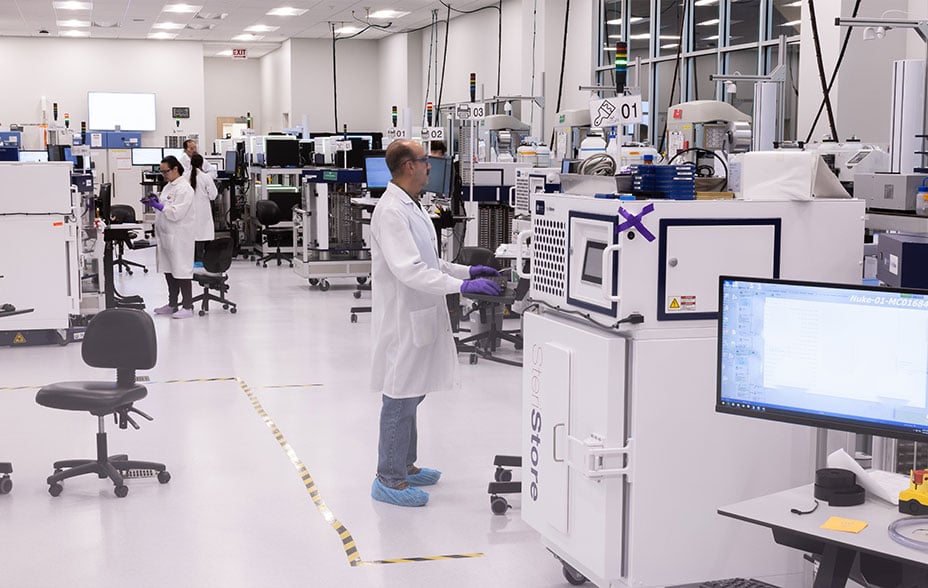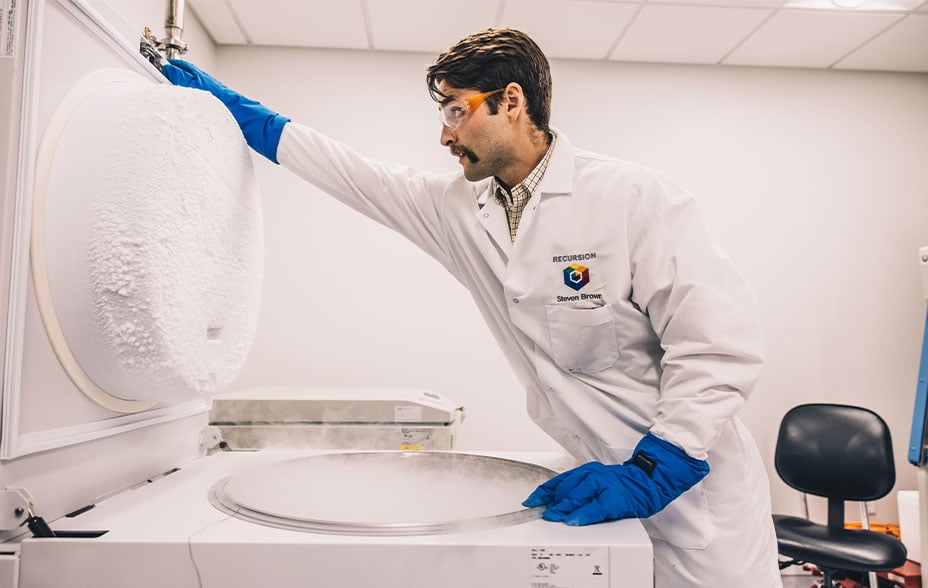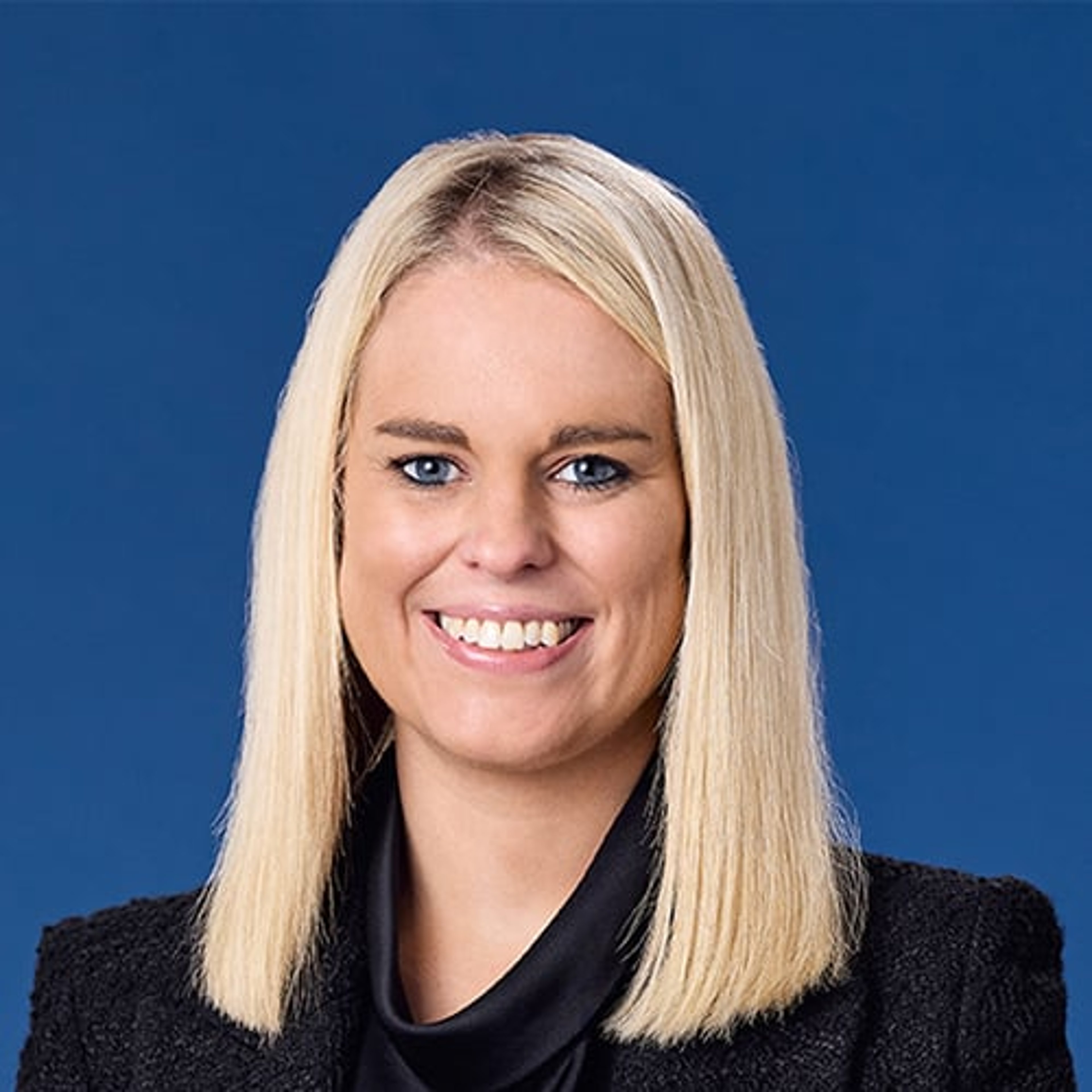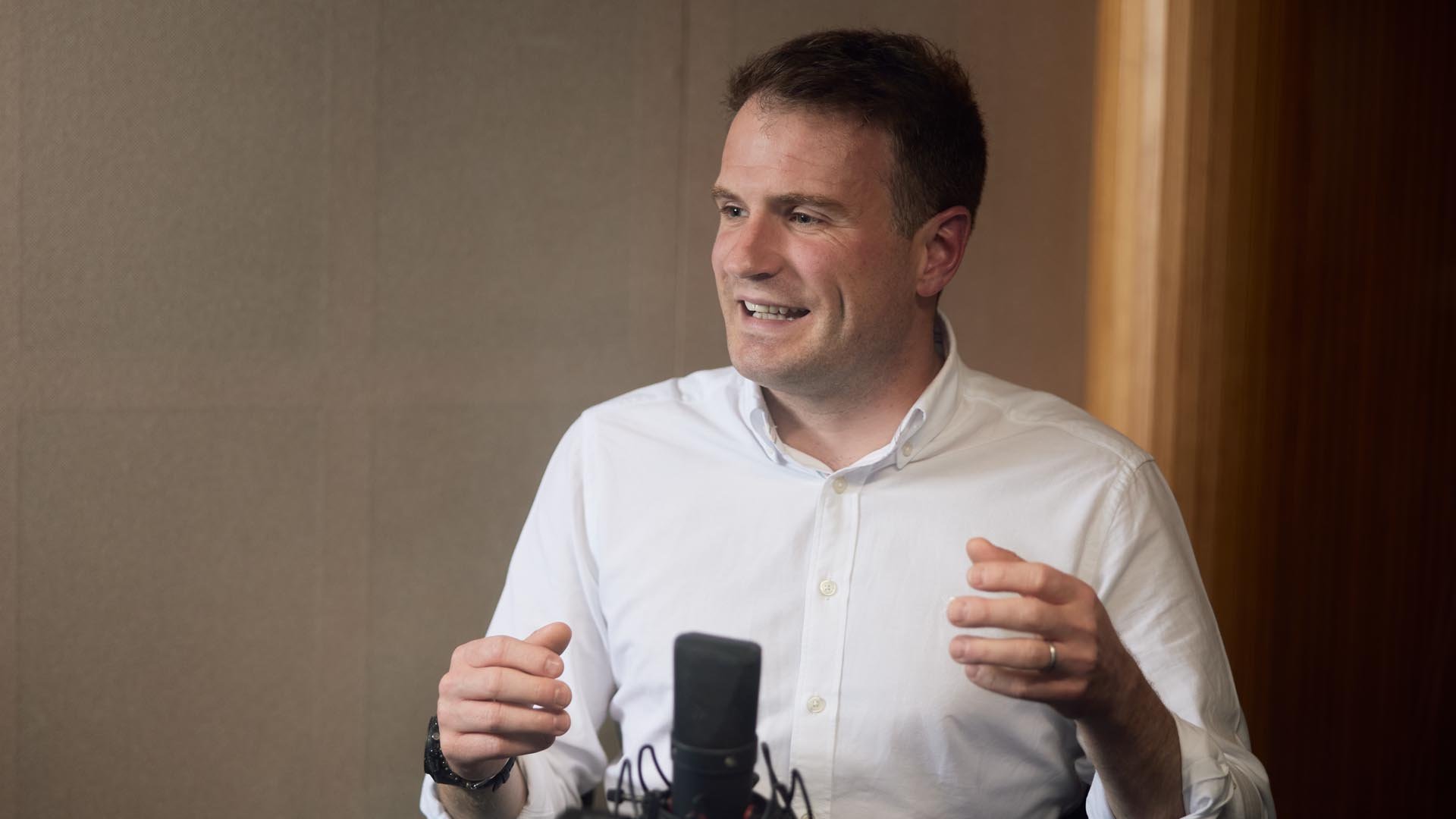
© Recursion Pharmaceuticals
As with any investment, your capital is at risk.
Discovering new medicines involves exploring the frontiers of biology and chemistry. But it’s also a ‘big numbers’ problem.
First, there is the biology problem: humans are complex beings. There are 20,000 plus genes inside each of us, encoding hundreds of thousands of proteins inside trillions of cells.
Then there is the chemistry problem: there are more treatments than could ever be tested. Researchers have estimated that there are 1060 molecules with potential drug-like traits. For context, that’s more than 5,000 times as many atoms as our solar system contains.
In recent decades, the development of new medicines has effectively relied on researchers stumbling upon promising treatments and recognising their worth.
Acknowledging, “we are lucky if we understand 2-3 per cent of biology”, Recursion Pharmaceutical’s co-founder and chief executive Chris Gibson believes the scale of the challenge warrants a different approach.
“What we’re trying to do is leverage technology – things such as robotics, machine learning and AI [artificial intelligence] – to take a broader view and start to build maps of biology and chemistry that allow us to home in on those places where there might be a potential treatment, much more quickly and efficiently,” he explains.
Using artificial intelligence, Recursion has already mapped out more than three trillion searchable gene and compound relationships. These maps should help us better understand biology and chemistry and how they interact, which should ultimately make it easier for scientists to navigate their way to new drugs more efficiently.
Treatments are initially developed ‘in silico’, meaning within computer software. That involves simulating how many thousands of potential drug candidates would interact with millions of disease models to identify compounds with interesting reactions.
“I tell people that we do my entire PhD’s worth of experiments every 15 minutes at Recursion, up to 2.2 million experiments a week.”
Only then do humans conduct tests in real-world laboratories to confirm or disprove the results.
“Sometimes our predictions are wrong,” acknowledges Gibson.
“But what we then done is generated new data… that can be used to retrain the model to make better predictions in that area of biology or chemistry in the future. So, it becomes essentially a learning system.”
LISTEN: CEO Chris Gibson speaks to Tom Slater about Recursion’s mission to decode biology with AI, and in doing so, discover new drugs.
By leveraging technology, Recursion can scale the process of finding new drugs:
A colleague likens this to the advent of the assembly line in the auto industry, where prior to that, in the United States, you had thousands of artisanal car builders who were building these vehicles by hand. And what Ford did was build an assembly line to try and increase the efficiency to make better, more reliable, less expensive cars. We’re taking that same philosophy to drug discovery.
A pharma company, but not as we know it
Commonly, companies form a hypothesis based on existing medical literature about how to treat a disease and then hunt for a substance to match, the chemistry part of the equation. Even those employing AI typically concentrate their efforts here..
By contrast, Recursion focuses on what Gibson believes is the harder question of biology: as in studying what changes are needed within cells to treat a disease. And going back to the premise that this is a big numbers problem, it is Recursion’s ability to interrogate big data sets using machine learning that means it can test a multitude of potential drugs before forming a hypothesis.
The benefit of this approach is that it should yield speed and efficiency savings. That means the company can go after:
- rarer diseases, where patient numbers wouldn’t normally justify the large upfront costs and long timescale needed to develop new drugs
- complex diseases, where a poor understanding of the biology involved has acted as a deterrent
- diseases for which Recursion’s process has led it to form a different hypothesis to other companies
If all goes well, Recursion’s methods should lead it to new types of game-changing drugs rather than incremental improvements to existing compounds, which typify the industry.
Going big on progress
The company has come a long way in a short time since its 2013 start.
“One of the great opportunities and challenges we had in founding Recursion was that the founding team was a physician, a computational scientist and myself, a bioengineer," Gibson recalls. “And only one of us had ever worked on drug discovery as a main focus.”
He says they started with a “clean sheet”, , asking “how would you discover a medicine in a better way if you were not constrained by how it’s been done in the past”.
In answering that question, the firm has created a “new language” to help its staff share knowledge from different disciplines and technologies.
“If you want to be successful, no matter how good your AI is, how good your robotics is, every company today still needs incredible people at its foundation,” he says.
“If you create an incredible culture and you create an incredible company, you can recruit and retain people from all around the world.”
“When we bring people in, it often takes them six to 12 months to really get onboarded because there is this complexity of a new language and a new way of thinking,” Gibson explains.
Given the time involved, it's critical to hold onto those new recruits, and the firm’s goals and Salt Lake City location, away from traditional biotech hubs, help in this regard.
“Our retention levels are much higher because people feel like they're part of a mission,“ Gibson says. “And they're not walking down the street, being distracted by a dozen offers a year to go join other companies.”

© Recursion Pharmaceuticals
Drug discovery at scale
With five drugs in clinical trials – the last stage of testing in humans before a drug comes to market – Recursion has already achieved more than most pharma companies of its size and age.
One of its most advanced programmes is a treatment for cerebral cavernous malformation. The disorder can lead to seizures, difficulty in speaking and problems with balance, among other problems.
It affects nearly five times as many patients in the US and Europe as cystic fibrosis but has received less attention to date.
“Because the biology was poorly understood, there's no companies with drugs in clinical development that we're aware of,” explains Gibson.
But the firm’s true value to its investors lies in the long-term promise of its unusual approach and technology platform.
The long-term outcomes should be new and better medicines, an improved understanding of biology and long-term growth for those who supported the company on its way.
Healthy Competition
Recursion has sometimes been creative with its recruitment methods. As Gibson explains, “data scientists have not been trained in biology; their last class in biology was maybe in high school, so they don’t know that they can contribute.”
For this reason, the company ran a competition in 2019, releasing “the largest dataset of its kind in the world” and asked teams of data scientists “build machine learning algorithms” to help discover new treatments based on the data.
It was more than just a recruitment exercise. It raised the profile of data scientists and the types of problems they can solve. “Maybe they don’t join Recursion,” says Gibson philosophically, “but they’re applying their efforts towards a problem as impactful as discovering and developing medicines.”
The event was so successful that the company has recently released an even bigger dataset.
Risk factors
The views expressed should not be considered as advice or a recommendation to buy, sell or hold a particular investment. They reflect opinion and should not be taken as statements of fact nor should any reliance be placed on them when making investment decisions.
This communication was produced and approved in March 2023 and has not been updated subsequently. It represents views held at the time of writing and may not reflect current thinking.
This communication contains information on investments which does not constitute independent research. Accordingly, it is not subject to the protections afforded to independent research, but is classified as advertising under Art 68 of the Financial Services Act (‘FinSA’) and Baillie Gifford and its staff may have dealt in the investments concerned.
All information is sourced from Baillie Gifford & Co and is current unless otherwise stated.
The images used in this communication are for illustrative purposes only.
Important information
Baillie Gifford & Co and Baillie Gifford & Co Limited are authorised and regulated by the Financial Conduct Authority (FCA). Baillie Gifford & Co Limited is an Authorised Corporate Director of OEICs.
Baillie Gifford Overseas Limited provides investment management and advisory services to non-UK Professional/Institutional clients only. Baillie Gifford Overseas Limited is wholly owned by Baillie Gifford & Co. Baillie Gifford & Co and Baillie Gifford Overseas Limited are authorised and regulated by the FCA in the UK.
Persons resident or domiciled outside the UK should consult with their professional advisers as to whether they require any governmental or other consents in order to enable them to invest, and with their tax advisers for advice relevant to their own particular circumstances.
Financial intermediaries
This communication is suitable for use of financial intermediaries. Financial intermediaries are solely responsible for any further distribution and Baillie Gifford takes no responsibility for the reliance on this document by any other person who did not receive this document directly from Baillie Gifford.
Europe
Baillie Gifford Investment Management (Europe) Limited provides investment management and advisory services to European (excluding UK) clients. It was incorporated in Ireland in May 2018. Baillie Gifford Investment Management (Europe) Limited is authorised by the Central Bank of Ireland as an AIFM under the AIFM Regulations and as a UCITS management company under the UCITS Regulation. Baillie Gifford Investment Management (Europe) Limited is also authorised in accordance with Regulation 7 of the AIFM Regulations, to provide management of portfolios of investments, including Individual Portfolio Management (‘IPM’) and Non-Core Services. Baillie Gifford Investment Management (Europe) Limited has been appointed as UCITS management company to the following UCITS umbrella company; Baillie Gifford Worldwide Funds plc. Through passporting it has established Baillie Gifford Investment Management (Europe) Limited (Frankfurt Branch) to market its investment management and advisory services and distribute Baillie Gifford Worldwide Funds plc in Germany. Similarly, it has established Baillie Gifford Investment Management (Europe) Limited (Amsterdam Branch) to market its investment management and advisory services and distribute Baillie Gifford Worldwide Funds plc in The Netherlands. Baillie Gifford Investment Management (Europe) Limited also has a representative office in Zurich, Switzerland pursuant to Art. 58 of the Federal Act on Financial Institutions (‘FinIA’). The representative office is authorised by the Swiss Financial Market Supervisory Authority (FINMA). The representative office does not constitute a branch and therefore does not have authority to commit Baillie Gifford Investment Management (Europe) Limited. Baillie Gifford Investment Management (Europe) Limited is a wholly owned subsidiary of Baillie Gifford Overseas Limited, which is wholly owned by Baillie Gifford & Co. Baillie Gifford Overseas Limited and Baillie Gifford & Co are authorised and regulated in the UK by the Financial Conduct Authority.
China
Baillie Gifford Investment Management (Shanghai) Limited
柏基投资管理(上海)有限公司(‘BGIMS’) is wholly owned by Baillie Gifford Overseas Limited and may provide investment research to the Baillie Gifford Group pursuant to applicable laws. BGIMS is incorporated in Shanghai in the People’s Republic of China (‘PRC’) as a wholly foreign-owned limited liability company with a unified social credit code of 91310000MA1FL6KQ30. BGIMS is a registered Private Fund Manager with the Asset Management Association of China (‘AMAC’) and manages private security investment fund in the PRC, with a registration code of P1071226.
Baillie Gifford Overseas Investment Fund Management (Shanghai) Limited
柏基海外投资基金管理(上海)有限公司(‘BGQS’) is a wholly owned subsidiary of BGIMS incorporated in Shanghai as a limited liability company with its unified social credit code of 91310000MA1FL7JFXQ. BGQS is a registered Private Fund Manager with AMAC with a registration code of P1071708. BGQS has been approved by Shanghai Municipal Financial Regulatory Bureau for the Qualified Domestic Limited Partners (QDLP) Pilot Program, under which it may raise funds from PRC investors for making overseas investments.
Hong Kong
Baillie Gifford Asia (Hong Kong) Limited 柏基亞洲(香港)有限公司 is wholly owned by Baillie Gifford Overseas Limited and holds a Type 1 and a Type 2 license from the Securities & Futures Commission of Hong Kong to market and distribute Baillie Gifford’s range of collective investment schemes to professional investors in Hong Kong. Baillie Gifford Asia (Hong Kong) Limited 柏基亞洲(香港)有限公司 can be contacted at Suites 2713–2715, Two International Finance Centre, 8 Finance Street, Central, Hong Kong. Telephone +852 3756 5700.
South Korea
Baillie Gifford Overseas Limited is licensed with the Financial Services Commission in South Korea as a cross border Discretionary Investment Manager and Non-discretionary Investment Adviser.
Japan
Mitsubishi UFJ Baillie Gifford Asset Management Limited (‘MUBGAM’) is a joint venture company between Mitsubishi UFJ Trust & Banking Corporation and Baillie Gifford Overseas Limited. MUBGAM is authorised and regulated by the Financial Conduct Authority.
Australia
Baillie Gifford Overseas Limited (ARBN 118 567 178) is registered as a foreign company under the Corporations Act 2001 (Cth) and holds Foreign Australian Financial Services Licence No 528911. This material is provided to you on the basis that you are a ‘wholesale client’ within the meaning of section 761G of the Corporations Act 2001 (Cth) (‘Corporations Act’). Please advise Baillie Gifford Overseas Limited immediately if you are not a wholesale client. In no circumstances may this material be made available to a ‘retail client’ within the meaning of section 761G of the Corporations Act.
This material contains general information only. It does not take into account any person’s objectives, financial situation or needs.
South Africa
Baillie Gifford Overseas Limited is registered as a Foreign Financial Services Provider with the Financial Sector Conduct Authority in South Africa.
North America
Baillie Gifford International LLC is wholly owned by Baillie Gifford Overseas Limited; it was formed in Delaware in 2005 and is registered with the SEC. It is the legal entity through which Baillie Gifford Overseas Limited provides client service and marketing functions in North America. Baillie Gifford Overseas Limited is registered with the SEC in the United States of America.
The Manager is not resident in Canada, its head office and principal place of business is in Edinburgh, Scotland. Baillie Gifford Overseas Limited is regulated in Canada as a portfolio manager and exempt market dealer with the Ontario Securities Commission (‘OSC’). Its portfolio manager licence is currently passported into Alberta, Quebec, Saskatchewan, Manitoba and Newfoundland & Labrador whereas the exempt market dealer licence is passported across all Canadian provinces and territories. Baillie Gifford International LLC is regulated by the OSC as an exempt market and its licence is passported across all Canadian provinces and territories. Baillie Gifford Investment Management (Europe) Limited (‘BGE’) relies on the International Investment Fund Manager Exemption in the provinces of Ontario and Quebec.
Israel
Baillie Gifford Overseas is not licensed under Israel’s Regulation of Investment Advising, Investment Marketing and Portfolio Management Law, 5755–1995 (the Advice Law) and does not carry insurance pursuant to the Advice Law. This material is only intended for those categories of Israeli residents who are qualified clients listed on the First Addendum to the Advice Law.




